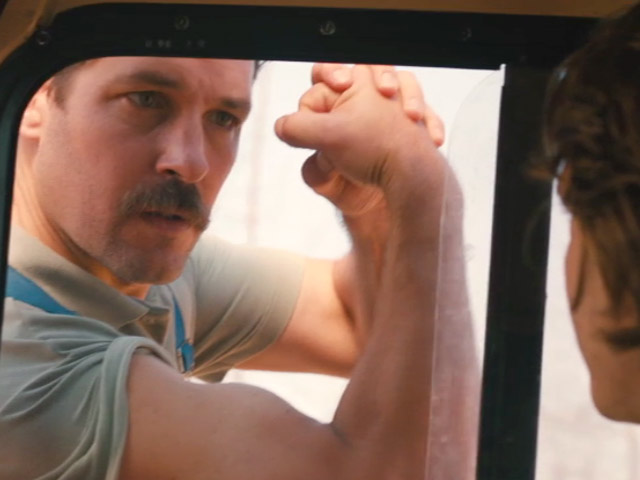My colleague Matt Zoller Seitz wrote The Wes Anderson Collection, a terrifically detailed tome about the terrifically detailed director Wes Anderson. At New York City’s Strand Bookstore, I moderated a panel about the book with Seitz (pictured left) and The New Yorker’s Richard Brody. And his beard.
Archive | Film Matters
The Cautious Joy of Short Term 12
 Short Term 12 is a hopeful movie about seemingly hopeless lives. It shows us young people whose stories already appear permanently written—desperately so—and then suggests they still can be rewritten. It is that rarest of films: one whose very flaws teach us to accept everyone else’s. Even our own.
Short Term 12 is a hopeful movie about seemingly hopeless lives. It shows us young people whose stories already appear permanently written—desperately so—and then suggests they still can be rewritten. It is that rarest of films: one whose very flaws teach us to accept everyone else’s. Even our own.
At its center is Grace (Brie Larson), the floor supervisor of a co-ed group home for adolescents who aren’t safe anywhere else. Scrubbed free of makeup, clad in tee shirts and jeans, and straddling the ten-speed she rides every day to work, she looks barely older than the kids she’s supervising. When she opens her mouth, though, it’s clear she is tapping into a core that only could have developed through years of hard-earned survival. The kids themselves are not so broken that they don’t still engineer scenario after scenario from which they must be rescued, if only to gauge whether someone still will. Grace and her colleagues willingly step up to those plates, cueing institutional methodology that works mostly because of their brisk, jocular kindness. One kid in particular—a scrawny-chested boy who caresses his collection of fuzzy dolls like they’re magic talismans—likes to don a cape and bolt from the institutional grounds until staff members tackle him in big bear hugs. Maybe he just runs to get hugged. So much of this film reminds us of how much we do either to get hugged or to avoid a hug lest we then feel too much.
There’s a tidiness to the plotting that doesn’t quite work. Early on, Grace discovers she’s pregnant and schedules an abortion. Soon after, Jayden (Kaitlyn Deve), the daughter of her boss’ friend, is checked onto her ward. Stonily fragile and bearing the unmistakable scars of a cutter, Jayden strikes a chord in Grace, who senses the girl’s secret is like her own. Continue Reading →
Death by Casting: Prince Avalanche’s Tale
 Prince Avalanche begins as silently as any of David Gordon Green’s films do: with footage of the forest fire-ravaged 1988 Texas landscape, followed by the figures of two men wordlessly performing roadwork in the same area. The images are lovely and terrible, lackadaisical and strained—the oddly comforting dissonance that characterizes all of Green’s dramas.
Prince Avalanche begins as silently as any of David Gordon Green’s films do: with footage of the forest fire-ravaged 1988 Texas landscape, followed by the figures of two men wordlessly performing roadwork in the same area. The images are lovely and terrible, lackadaisical and strained—the oddly comforting dissonance that characterizes all of Green’s dramas.
But as the film revs up, the THC-inspired goofiness of his comedies The Pineapple Express and Your Highness quickly creeps in. The two men are Alvin (Paul Rudd) and Lance (Emile Hirsch), and we grasp their Abbot and Costello dynamics long before we sort out any other details of their relationship. While tasked with repairing the roads in the region, they are roughing it in the wilderness. Alvin, older, heftier, and more self-possessed, gently bosses Lance, who seems impervious to everything above the waist. (You know you’re dealing with unusually short men when Rudd looms as the big man in the duo.) While Alvin writes letters and studies German, Lance flips through comic books. While Alvin sleeps in their shared tent, Lance jerks off. The elder’s Achille’s heel reveals itself soon enough, however: It’s Madison, Lance’s sister, whom Alvin loves but also has fled. In his own way, Alvin is at least as much of a fuckup as Lance, whom he has speculated may be “mildly retarded.”
When the weekend arrives, Lance hightails it back to town in the hopes of getting laid, and Alvin basks in his solitude. He fishes; he reads; he wanders through the woods, a reverie of saturated greens and rust colors. And it’s at that point that Paul Rudd, rather than Alvin, begins to shimmer into focus. For Alvin gets silly as only Rudd can: He flops in the water. He does a weird jig. He juts his hip out at a crazy angle. He is, in other words, too cartoonlishly outsized to read legibly as a guy foolish only in his degree of anal-retentiveness—a guy who has sought a Thoreau-like isolation to cool his dangerous temper. Alvin may be slotted as the straight man in this mundo bizarro but Rudd can’t help but put a wag in his tail. Continue Reading →
